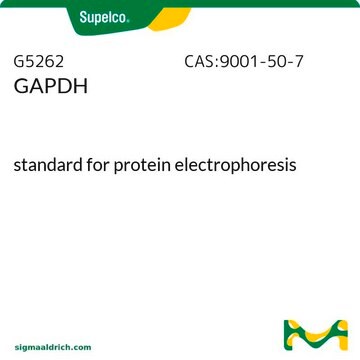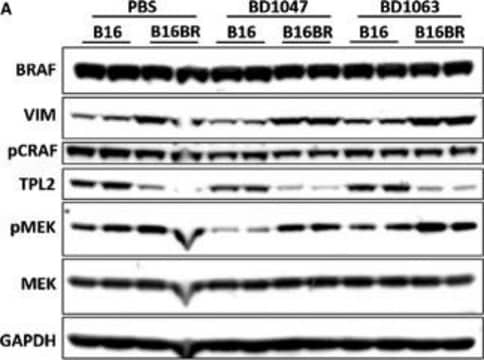G6019
Glyceraldehyde-3-phosphate Dehydrogenase from human erythrocytes
lyophilized powder, 50-150 units/mg protein
Synonym(s):
D-Glyceraldehyde 3-phosphate:NAD+ oxidoreductase (phosphorylating), GAPDH
About This Item
Recommended Products
form
lyophilized powder
Quality Level
specific activity
50-150 units/mg protein
composition
Protein, 40-70% biuret
UniProt accession no.
foreign activity
3-Phosphoglyceric phosphokinase ≤2%
storage temp.
−20°C
Gene Information
human ... GAPDH(2597)
Biochem/physiol Actions
Unit Definition
Physical form
inhibitor
Storage Class Code
11 - Combustible Solids
WGK
WGK 3
Flash Point(F)
Not applicable
Flash Point(C)
Not applicable
Certificates of Analysis (COA)
Search for Certificates of Analysis (COA) by entering the products Lot/Batch Number. Lot and Batch Numbers can be found on a product’s label following the words ‘Lot’ or ‘Batch’.
Already Own This Product?
Find documentation for the products that you have recently purchased in the Document Library.
Customers Also Viewed
Articles
Warburg effect enhances glucose to lactate conversion in tumor cells, regardless of oxygen levels; impacting cancer metabolism since 1924.
Warburg effect enhances glucose to lactate conversion in tumor cells, regardless of oxygen levels; impacting cancer metabolism since 1924.
Warburg effect enhances glucose to lactate conversion in tumor cells, regardless of oxygen levels; impacting cancer metabolism since 1924.
Warburg effect enhances glucose to lactate conversion in tumor cells, regardless of oxygen levels; impacting cancer metabolism since 1924.
Our team of scientists has experience in all areas of research including Life Science, Material Science, Chemical Synthesis, Chromatography, Analytical and many others.
Contact Technical Service











